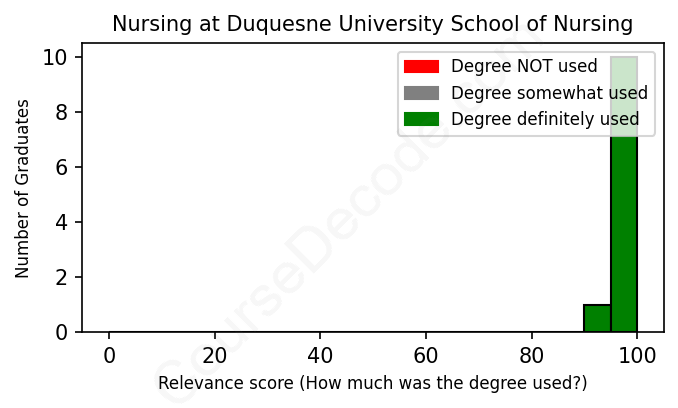
First, some facts. Of the Nursing graduates from Duquesne University School of Nursing we've analyzed , here's how many have used (or NOT used) their degree in their career:

These are estimates based on AI analysis of 11 LinkedIn profiles (see below).
The verdict? Fantastic! Overall, with an average relevance score of 99%, Nursing graduates from Duquesne University School of Nursing have an exceptionally higher likelihood (+32%) of finding work in this field compared to the average graduate across all fields:
And for comparison, here's the chart for all profiles we've looked at across all degrees.
Also, after graduating, only 27% of these graduates have pursued further education other than another Bachelor's degree (such as a Masters degree or other), compared to the average across all profiles of 35%. This suggests a Bachelors degree is enough for most Nursing graduates, and it's normal to look for work straight after graduation.
See the details:
|
Relevance score: 100% We think this person has gone into a career highly relevant to their degree. We think this person has gone into a career highly relevant to their degree.
DEGREE INFOGraduated in 2020 from Duquesne University School of Nursing with a Bachelors Degree in Nursing. No other secondary education since. JOB HISTORY SINCE GRADUATIONRegistered Nurse Allegheny Health Network Jul 2020 - Present ABOUTNo information provided. |
The top 10 most common jobs done by the graduates we've analyzed (ranked most common to least) are:
After analyzing the job profiles of graduates from the Duquesne University School of Nursing, it's clear that a significant number of them are working in roles that are directly related to nursing. Many recent graduates have taken up positions such as Registered Nurses at various healthcare facilities like UPMC and Allegheny Health Network. These roles require the use of the skills and knowledge gained from their nursing degrees, which makes them highly relevant to their field. In fact, most job titles I came across, especially those held by more recent graduates, directly apply the clinical and patient care knowledge gained during their studies.
On the other hand, there are a few who have ventured into more niche areas like Aesthetic Nurse Practitioners or Aesthetic Nurse Injectors. While these roles do involve nursing skills, they are more focused on cosmetic procedures than on traditional patient care, which makes them somewhat less relevant in a conventional nursing context. Overall, though, the majority of jobs held by these graduates are solidly rooted in nursing practice, showcasing how a degree from Duquesne equips them with valuable, applicable skills that lead to successful careers in healthcare.
Here is a visual representation of the most common words in job titles for Nursing graduates (this is across all Nursing graduates we've analyzed, not just those who went to Duquesne University School of Nursing):

Based on the profiles of recent graduates from Duquesne University School of Nursing, it looks like many of them are starting their careers as registered nurses straight out of school. For instance, those who graduated in 2023 are landing positions as registered nurses across various healthcare facilities like UPMC and Allegheny Health Network, showing a strong trend of beginning their nursing careers in clinical settings. This is pretty typical for new nursing graduates, as they often dive into hands-on roles to build their experience and skills.
As these nurses progress in their careers over the next five to ten years, there seems to be a pattern of advancement into more specialized roles. Several graduates have transitioned into positions like nurse practitioners, which suggests they are pursuing further education and certifications beyond their initial RN roles. For example, one graduate moved from a staff nurse position to a nurse practitioner role and then further specialized into aesthetic and family nursing. Overall, it appears that Duquesne nursing graduates find solid paths within the nursing field, with many progressing into higher-level and specialized positions as they gain experience. This is a positive sign for anyone considering a nursing career at Duquesne, as it indicates achievable advancement and a generally successful trajectory within the profession.
Okay, so diving into a Bachelor’s degree in Nursing, especially at a place like Duquesne University, is definitely challenging but manageable if you're dedicated. The courses are intense; you’ll be hitting the books hard, juggling classes like anatomy and pharmacology while also getting hands-on training in clinical settings. Plus, there’s a ton of memorization involved, which can feel overwhelming at times. But it’s also super rewarding, and a lot of students find that they really thrive once they get into the rhythm of it. So, while it’s not a walk in the park, if you’re passionate about nursing and ready to put in the effort, you can totally handle it!
Most commonly, in the LinkedIn profiles we've looked at, it takes people 4 years to finish a Bachelor degree in Nursing.
So, when you look at these nursing graduates from Duquesne University, it seems like most of them are doing pretty well for themselves in terms of money. The ones who've been around in the field longer, especially those who transitioned to Nurse Practitioner roles, can make a decent salary—like significantly more than a typical RN, especially in specialized areas like aesthetics or family health. Even the newer grads are starting off as RNs, which is a solid paycheck straight out of school, and they’ll likely move up over time. Overall, it looks like these folks have clear paths to making good money in healthcare.
Here is a visual representation of the most common words seen in the "about" section of LinkedIn profiles who have a Bachelor degree in Nursing (this is across all Nursing graduates we've analyzed, not just those who went to Duquesne University School of Nursing). This may or may not be useful:

Here are all colleges offering a Bachelor degree in Nursing (ordered by the average relevance score of their Nursing graduates, best to worst) where we have analyzed at least 10 of their graduates: